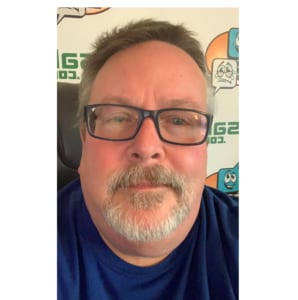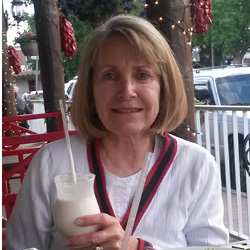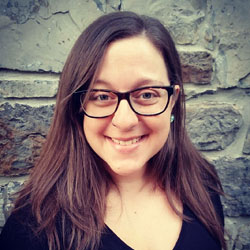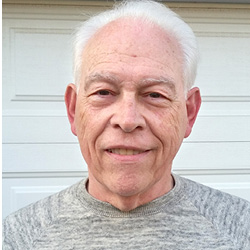 Finding Hope in the Stories of Others
Finding Hope in the Stories of Others
By Scott Steehn
All stories have a beginning, and mine is no different. It started on a cold, slate-colored February day in Erie, Pennsylvania in 1992. I was a successful standup comic who had headlined clubs and theaters in all 50 states and seven foreign countries. I was recently engaged to my soulmate, and we were making plans for a big October wedding. I was just finishing up a great week at a terrific comedy club in Erie and, as I prepared for my two shows on Saturday night, I felt like everything couldn’t have been going any better. But, in just 12 hours, none of those things would matter.
It started when I was onstage during the first show. I began having abdominal pain on my left, lower side. It wasn’t a huge pain and mainly felt like a had a fairly intense need to move my bowels. I finished up my show and made a beeline to the restroom. And…nothing happened. Nothing at all. The NEED was still there, and, in fact, it was getting worse. I, of course, had been constipated before, but this felt somehow…different.
I did my second show, but the pain was now almost unbearable. I headed back to my hotel, stopping only at a drugstore to pick up a laxative. I had convinced myself it was just constipation and had even assigned the blame to the shrimp dinner I’d had the night before. “Fresh Shrimp” in February…in Erie?! What did I expect to happen?
I took the laxative. And I waited. And tried. And waited some more. And then the pain got bad. Real bad. I could barely walk and couldn’t move without intense pain shooting out from my left side. Now I had a new theory. Burst appendix. This was before the days of Web MD, and I was limited to only what my imagination could conjure to freak myself out. So, not wanting to die a ridiculous death in the Erie Hilton, I called a taxi and headed to the hospital.
They got me into an exam room in short order. The doctor examined me and, taking advantage of his fancy medical degree, immediately eliminated appendicitis. So much for that. He then told me he had an idea what it was but wanted an MRI to confirm the results. A quick trip through the “donut of doom” confirmed his initial diagnosis. It was something called diverticulitis. He explained how we all have small abscesses in the colon and how they usually don’t cause any problems. Sometimes, however, those abscesses become infected. It causes horrible pain and constipation, and once it gets this bad, it has to be treated with antibiotics and mass quantities of fluids. I spent a painful week in the hospital and was discharged with very specific instructions on how to adjust my diet and lifestyle to prevent a recurrence. I thanked all the staff for the great job they did, signed some papers, checked out…and promptly ignored his instructions for the next 20 years.
Christmas Eve, 2012. My wife has had enough. The final straw came when I was unable to make it upstairs for the family gift exchange. As soon as it was over, she came down and told me we were going to head to the emergency room. I didn’t have the energy to argue. Plus, I knew she was right. I’d been feeling terrible for almost three years. Something was definitely not right. It seemed like it emanated from the “diverticulitis spot” that I had become intimately familiar with due to the flare-ups I suffered through two or three times a year. The only confusing part was I had undergone a colonoscopy six months prior and had received a clean bill of health. Only much later did I learn that I had received a negligent result. My doctors all agreed- there was no way my problem could have been missed.
I should have known I was in trouble when, after the emergency room doc saw me initially, he asked me if I’d like anything for pain. I jokingly said, “Sure, how about some morphine?” He immediately replied, “Okay, we’ll get that going for you.” Uh oh. A little later he told me I had a blockage that had been caused by a buildup of scar tissue from the repeated flare-ups of diverticulitis. They needed to get rid of the infection and then remove the two damaged sections of bowel. Surgery was scheduled for New Year’s Eve. Merry Christmas and Happy freaking New Year!
I spent the next week in a morphine haze. I met my surgeon, a brilliant young lady who looked impossibly young for someone with that much schooling. She explained that they were hoping to remove the damaged sections laparoscopically. It was a relatively simple procedure that would require a couple of days of recovery in the hospital, a week or two at home, and then back to my normal life. The alternative would be invasive surgery, much longer recovery time, and, while the healing took place, I would need to have a colostomy. Due in part to my opiate fog and also due to my refusal to accept reality, I was 100% convinced everything would be done laparoscopically. No worries.
The first thing I noticed when I came to was something in my throat. Something huge and foreign. As my world blinked into focus, the nurse was there to explain to me that the damage was much worse than they had anticipated. Full surgery had been performed and I was going to be in the hospital for a while. The drugs were very helpful in allowing me to deny exactly what exactly that meant. I was much more concerned with getting the tube out of my throat and the catheter out of the other end. That cavalier attitude about my situation would soon change.
The nurses and staff were great. They changed my colostomy bag for me and allowed me to STILL not grasp my situation. That all changed when I met the ostomy nurse. She was tasked with teaching me the intricacies of daily life with a colostomy. Reality came crashing through the door when I spent 30 minutes hiding in the restroom in tears unable to change my bag. I can’t do this! This isn’t fair! (Conveniently forgetting the 20 years I had spent ignoring my doctor’s orders) Gathering myself, I sucked it up, and FINALLY was able to do it on my own. I was discharged and sent home to recuperate and heal for 30 days before heading back to the hospital for takedown surgery.
I’d like to tell you a story about how well I adjusted. About how I was brave. About how I was thankful to be alive. About how I now appreciated my friends and family even more. About how I would now refused to take all the beauty of life for granted. That’s the story I’d like to tell. But I can’t. It would be a lie. Even though none of you know me, I promised myself I would be 100% honest about my journey. Warts and all. So here goes.
It was awful. I hated every minute of it. I thought having a colostomy was gross. And hard. Life wasn’t fair. NOTHING was fair. I can’t do this. There were the usual indignities. Accidents. Broken seals. Excess gas. I was in hell. Never for one moment did I think how my situation affected those around me. How my actions and attitude affected my family, and, my wife in particular, who only wanted me to get better and get back to being the man she married. As an added bonus, I was also taking 12 Oxycodone a day for pain, and, rightly suspected, now had a raging opioid addiction. My day consisted of sleeping, crying, bitching at my family, thinking about death, and dealing with my new, hated, appendage. Day after day. Rinse, lather, repeat.
Then, one day while noodling around on the internet, I found UOAA. I started reading about my condition. And I started reading other people’s stories. I found out just how many dealt with this particular challenge. I was stunned. And the more stories I read, the more my respect grew. People who had to deal with this for years. For decades. Tears streamed down my face as I read their stories. I’d love to tell you everything changed that day. How my attitude changed overnight and how I became Mr. Positivity. Alas, it wasn’t that simple.
What DID happen, is I became embarrassed about my actions. I had always prided myself on being a tough guy who dealt with problems head-on. The more I read on ostomy.org, the more I knew this was a lie.
Every day I read the stories of real heroes. Men and women who possessed the biggest superpower of all, the ability to live a normal life despite adversity that was currently bringing me to my knees. To say they inspired me, would be an understatement. Closer to the truth would be, they saved my life.
They gave me practical advice, “insider tips” on everything from bathing to sex, and something I hadn’t felt in a long time. They gave me hope. I never posted on the UOAA discussion board. Hell, I don’t think I even registered. Due to my “temporary” status, I really didn’t think anyone wanted to hear my whining. If everything went well, my life would go back to “normal,” while these people would continue to lead quietly heroic lives day after day, year after year. I didn’t feel worthy. And I still don’t.
That’s my story. Sure, there’s more, including an unsuccessful takedown, massive infection, emergency surgery, and an ileostomy for a few more months. There was a wound vac, and an in-home nurse to change my dressing daily. And, of course, after 6 ½ months of daily opioid use, I still had to deal with that King Kong-sized habit. Yet, in the end, I was okay. It probably took almost two years to feel like me again. And even that isn’t completely accurate.
I recovered, I felt better physically, but “myself” was different. I was more appreciative, more humble, and more thankful. I was well, but I’d never be the same.
So, thanks for reading. Thanks to Ed Pfueller for giving me an opportunity to share my story. Thanks to the whole team at UOAA and, for that matter, all of the sites designed to educate, inform, and help everyone on this particular journey. Lastly, more thanks than I could ever express to all the men and women who bravely shared their stories through blogs and forums. Thanks for your bravery. Thanks for your humor. And thanks for giving me the courage to understand and accept my condition with, what I hope, was grace and determination that would make you all proud. God bless each and every one of you and may your lives be full of the joy and love that you so richly deserve. I am forever in your debt.

 Finding Hope in the Stories of Others
Finding Hope in the Stories of Others My colostomy story began when, at age 56, I discovered that I had late-stage colorectal cancer. A large tumor was discovered during my first colonoscopy, and it was cancerous. Thus began a long journey that eventually led to colostomy surgery on my 64th birthday. After the initial surgery to remove the tumor and part of my colon and rectum, I had radiation and two rounds of chemotherapy. The radiation permanently damaged my intestines and caused a bowel blockage that required more surgery, followed by years of chronic diarrhea and abdominal pain. I finally found a surgeon in my home state who cut out some of the intestinal damage and gave me the surgery that infinitely improved my quality of life.
My colostomy story began when, at age 56, I discovered that I had late-stage colorectal cancer. A large tumor was discovered during my first colonoscopy, and it was cancerous. Thus began a long journey that eventually led to colostomy surgery on my 64th birthday. After the initial surgery to remove the tumor and part of my colon and rectum, I had radiation and two rounds of chemotherapy. The radiation permanently damaged my intestines and caused a bowel blockage that required more surgery, followed by years of chronic diarrhea and abdominal pain. I finally found a surgeon in my home state who cut out some of the intestinal damage and gave me the surgery that infinitely improved my quality of life. Saying that my ostomy gave me my life back is not an understatement. I don’t think I have ever felt better in my entire life. I was diagnosed with Crohn’s when I was 15 and in the 12 years I suffered before having surgery, I never once achieved full remission. I missed more school than I attended, had to take a medical withdrawal from college, and struggled to find and keep a job. I was in so much pain and having so many symptoms that I couldn’t leave the house for entire days at a time.
Saying that my ostomy gave me my life back is not an understatement. I don’t think I have ever felt better in my entire life. I was diagnosed with Crohn’s when I was 15 and in the 12 years I suffered before having surgery, I never once achieved full remission. I missed more school than I attended, had to take a medical withdrawal from college, and struggled to find and keep a job. I was in so much pain and having so many symptoms that I couldn’t leave the house for entire days at a time. I had ulcerative colitis that was unresponsive to any treatments including remicade infusions. In January of 2006 I had ostomy surgery. My first comment was “It is so quiet down there.”
I had ulcerative colitis that was unresponsive to any treatments including remicade infusions. In January of 2006 I had ostomy surgery. My first comment was “It is so quiet down there.”
